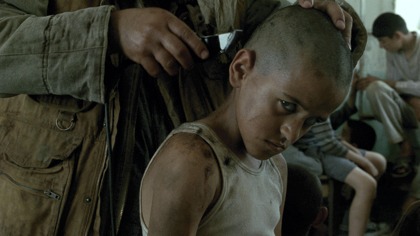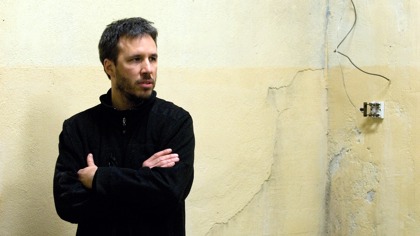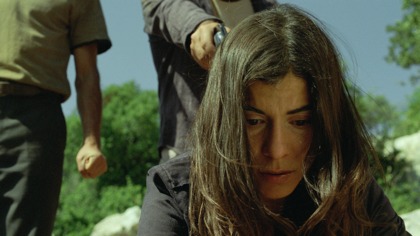Interview
Blood lines:
Denis Villeneuve on Incendies

The French-Canadian filmmaker talks local secrets and Middle Eastern tragedies with Tom Dawson
“I don’t think of it as a movie about war: I think of it as a movie about family”, says Québécois writer-director Denis Villeneuve of his acclaimed fourth feature Incendies (‘Scorched’). A strikingly cinematic adaptation of Lebanese-born French-Canadian Wajdi Mouawad’s 2003 play of the same name, this intimate epic interweaves the personal, political and mythical, gripping the viewer right from its opening sequence of child soldiers having their heads shaved to the soundtrack of Radiohead’s ‘You and Whose Army?’.
Spanning some four decades, Incendies shifts between two parallel narratives. In the present, adult Canadian twins Jeanne (Melissa Desormeaux-Poulin) and Simon (Maxim Gaudette) find themselves in the unnamed Middle Eastern homeland of their recently deceased Arab mother Nawal (Lubna Azabal), whose will stipulates they track down a father they presumed was dead and an older brother they didn’t know existed. And in the past we witness Nawal herself being tragically caught up in a civil war that pits Christians against Muslims.
Villeneuve originally saw Mouawad’s play at a small theatre in Quebec back in 2004, and was profoundly affected. “I wasn’t looking for material to adapt. My previous films August 32nd on Earth [1998] and Maelström [2000] had been based on original screenplays”, the 44-year-old recalls. “But after we came out of the theatre that night my wife looked at me and said, ‘Oh my God, you’re going film that, aren’t you?’ The play was three-and-a-half hours long, very talkative and full of powerful theatrical images. Yet I made my decision right away, and for the next five years I woke up every day happy to be working on the film.”
Villeneuve was already preparing another film called Polytechnique, which explored a real-life massacre of female students at a Montreal engineering college. “I switched between the two projects, spending three months on each in turn”, he explains. “Both were ready to shoot at the same time, but Polytechnique was less complicated logistically and easier to finance. I remember going to Cannes for 24 hours to do press on Polytechnique, then flying straight back to the shoot of Incendies.”

Denis Villeneuve
The director is quick to praise Mouawad, not just for giving him the rights to film the play, but also for giving him complete creative freedom in his adaptation. “That was the most beautiful artistic gift,” enthuses Villeneuve. “He told me to do whatever I wanted, whether I wanted to use just the title, a scene or a character. I always tried to stay faithful to his vision, even while removing big chunks of the play. I kept the dramatic structure, the key ideas and main characters.
“The hardest thing was working in a milieu outside my own,” he continues. “I’d been to the Middle East before, but I still felt like a total tourist – unlike Wajdi, who was born in Lebanon and had left with his family during the civil war. I think that’s why I approached the story from the angle of the family: like me, the twins are outsiders in this Arab culture.”
Indeed, it’s Jeanne and Simon’s quest to uncover the mysteries of their mother’s early life which gives Incendies such universal resonance. “The life experiences of your parents affect you as an adult,” says Villeneuve. “You can see that anger has been passed down from Nawal to her children – but by finding out the truth about what happened to her and why she became how she was, they can start to be free. Of course it’s a painful process, but the idea of change is really important in the film. People can evolve and cycles of violence and hatred can end.”
It was the part of Nawal which proved hardest to cast, and Villeneuve assumed that he would need to find two or even three actresses to play the character at different stages of her life. His casting director in Paris suggested Lubna Azabal, best known for her roles in Paradise Now (2005) and Exiles (2004), and her screen test was exceptional. “We got her to read out some letters, and she looked about 18, even though in real life she’s 30,” Villeneuve recalls. “I knew that with makeup we could age her for the scenes in Canada. Artistically, I fell in love with her immediately. She simply was Nawal.”

Shot in Jordan and Quebec, Incendies boasts an impressive visual sweep, yet Villeneuve stresses he wished to keep his mise en scène “as humble as possible. The goal was not to be stunning, not to show off, especially in the scenes concerned with war. I wanted to show the victims’ point of view and not make the action exciting,” he says. “It was important that there was a relationship between the landscapes and the inner feelings of the characters walking through them. I tried never to fall into the trap of exoticism.”
At the beginning of his career in the late 1990s, Villeneuve was grouped alongside fellow Québécois directors such as Robert Lepage, Adrian Turpin (his cinematographer on Incendies) and Claude Lauzon. How does the current filmmaking scene in French-speaking Canada compare to that era?
“The truth is that filmmaking is more vibrant than ever in Quebec. You’ve got a new generation of directors like Jean-Marc Vallée [C.R.A.Z.Y., 2005] and Xavier Dolan [Heartbeats, 2010]. The question is whether audiences around the world will have a chance to see their films.”
Will Villeneuve himself be heading back to home territory after finishing his promotional work on Incendies?
“I’ve been asked to direct an American film, Prisoners, in the [autumn]. It’s a great screenplay but it’s about torture, and after Polytechnique and Incendies I think it’s too dark and tough for me at the moment. I want to get back to directing my own projects.”
‘Incendies’ is released in the UK on 24 June.
See also
Incendies reviewed by Roger Clarke (July 2011)
Lebanon reviewed by Roger Clarke (June 2010)
The Barbarian Invasions reviewed by Philip Kemp (March 2004)
Ararat reviewed by Peter Matthews (May 2003)
The Five Senses reviewed by Liese Spencer (January 2000)
West Beirut reviewed by Geoffrey Macnab (August 1999)
Nô reviewed by Richard Falcon (April 1999)
